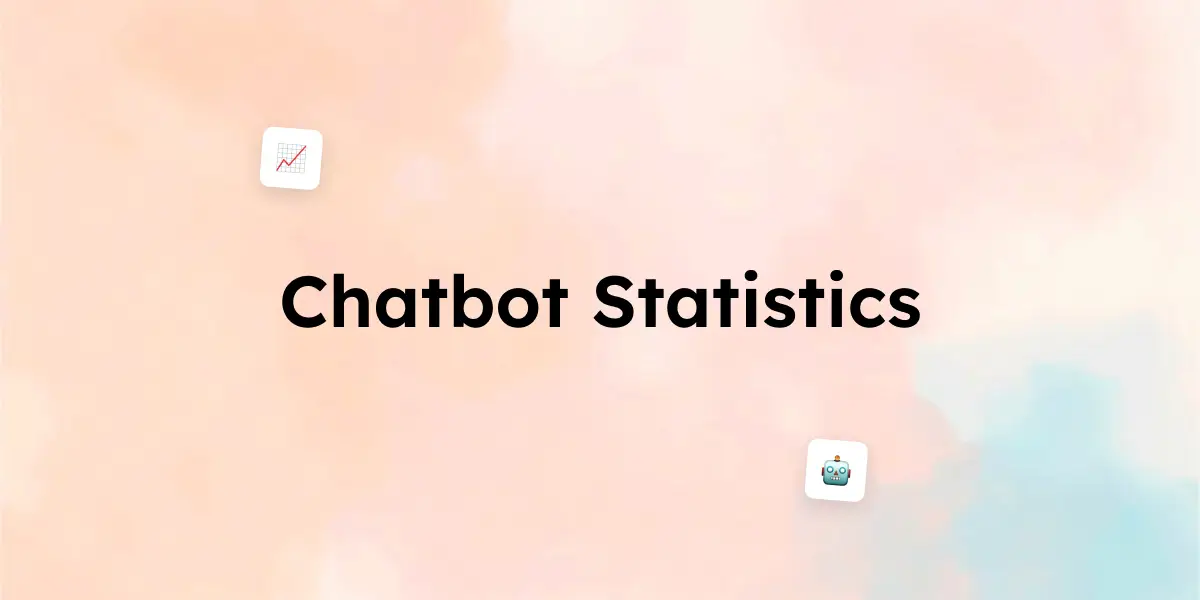Chatbots have transformed the way businesses interact with customers, streamlining customer support, sales, and marketing. As artificial intelligence (AI) and natural language processing (NLP) continue to advance, chatbots are becoming more intelligent, efficient, and widely adopted across industries.
In 2025, chatbots are expected to play an even bigger role in business operations, offering instant responses, cost savings, and personalized customer experiences. This article highlights 60+ chatbot statistics that businesses should note to stay ahead in the competitive digital landscape.
60+ key chatbot statistics
1. Market Growth & Adoption
- The global chatbot market is projected to reach $14 billion by 2025 (CAGR of 23% from 2020).
- 80% of businesses are expected to integrate chatbots in some form by 2025.
- 53% of service-based companies are actively using AI chatbots for customer interactions.
- The eCommerce industry alone will account for 45% of chatbot usage by 2025.
- Banking & healthcare sectors are among the fastest-growing industries adopting AI chatbots.
2. Customer Experience & Engagement
- 70% of customers now expect instant responses from businesses, making chatbots essential.
- AI chatbots can resolve 80% of standard customer queries without human intervention.
- 90% of consumers say quick response times are critical in customer service.
- Chatbots help reduce wait times by 35-50% on average.
- 68% of users prefer chatbots because of their 24/7 availability.
3. Business Benefits & Cost Savings
- Chatbots are expected to save businesses $11 billion annually by 2025.
- Implementing chatbots can cut customer service costs by up to 30%.
- 64% of customer support agents say chatbots free them for more complex tasks.
- AI-powered chatbots improve conversion rates by 10-25%.
- Chatbots can handle 80% more queries per hour than human agents.
4. Consumer Behavior & Preferences
- 55% of consumers prefer using chatbots for quick responses to simple queries.
- 77% of users say they’re more likely to purchase from a brand offering chatbot support.
- 44% of millennials prefer chatbots over human representatives for customer support.
- 35% of consumers want chatbots that provide personalized recommendations.
- 42% of Gen Z users say they use chatbots for customer service at least once a month.
5. AI Chatbot Advancements
- By 2025, 95% of chatbots will use some form of natural language processing (NLP).
- AI-powered chatbots will reduce response time by an average of 3x.
- Voice-enabled chatbots will grow by 25%, with increased integration into smart devices.
- 85% of businesses will use AI chatbots for internal tasks like HR and IT support.
- AI chatbots will power 50% of B2B customer interactions by 2025.
6. Chatbots & Social Media
- Facebook Messenger bots handle over 20 billion messages per month.
- Instagram chatbots are expected to grow by 30% in business adoption by 2025.
- WhatsApp Business chatbots have a 98% open rate, making them a powerful tool.
- Twitter bots contribute to over 20% of brand interactions on the platform.
- LinkedIn chatbots are becoming popular in B2B sales & recruitment automation.
7. eCommerce & Retail Chatbot Usage
- 50% of shoppers prefer chatbots for order tracking & customer support.
- AI chatbots increase cart conversion rates by 15-20%.
- 47% of online shoppers are willing to buy items via chatbot recommendations.
- AI-powered virtual shopping assistants can boost revenue by 30%.
- Chatbots help reduce cart abandonment rates by 25%.
8. Healthcare & Finance Chatbots
- Healthcare chatbots are expected to grow by 35% annually.
- AI chatbots can handle 75% of routine medical inquiries, reducing strain on professionals.
- 56% of patients prefer AI chatbots for appointment scheduling.
- Financial chatbots are used by 60% of banking customers for transaction support.
- 35% of bank inquiries will be handled via AI chatbots by 2025.
9. Chatbot Challenges & Limitations
- 37% of consumers say chatbots should sound more human.
- 41% of chatbot users get frustrated when responses are repetitive.
- 25% of businesses struggle with chatbot integration into existing systems.
- Only 20% of companies have fully AI-powered chatbots; most use hybrid models.
- 52% of businesses say chatbot personalization is their biggest challenge.
10. Future Predictions & Trends
- AI chatbots will replace 50% of customer service roles in routine inquiries.
- Chatbots will be used by 90% of companies for customer interactions by 2030.
- More than 80% of AI chatbots will be multimodal, supporting text, voice, and video.
- AI chatbots will reduce call center volumes by 40%.
- Self-learning chatbots (powered by AI & ML) will improve response accuracy by 60%.
11. Industry-Specific Chatbot Growth
- Retail chatbots will influence $150 billion in sales by 2025.
- Travel industry chatbots will handle 70% of customer queries for bookings.
- Real estate chatbots will assist in 40% of property inquiries.
- HR chatbots will be used by 60% of companies for hiring and onboarding.
- Education chatbots will assist 50% of online learning platforms.
12. Consumer Trust & Security
- 67% of users are concerned about chatbot security.
- 40% of businesses are investing in chatbot data protection measures.
- 30% of consumers hesitate to share sensitive information with chatbots.
- AI chatbots with end-to-end encryption will become a standard in financial services.
- Regulations on AI chatbots will increase, with stricter data privacy laws.
Conclusion
As businesses continue to adopt AI-driven solutions, chatbots will become an essential tool for improving efficiency, customer experience, and engagement. From reducing operational costs to increasing sales conversions, chatbots offer numerous benefits that companies cannot afford to ignore.
However, challenges such as AI limitations, personalization issues, and security concerns still need to be addressed. Businesses that leverage the latest chatbot advancements and focus on user experience will be the ones to gain a competitive advantage in the future.
By 2025, chatbots will not just be an optional tool but a necessity for business success. 🚀
FAQs
1. What industries benefit the most from chatbots?
Industries that benefit the most from chatbots include eCommerce, banking, healthcare, travel, real estate, and customer service. These sectors use chatbots to automate support, provide instant responses, and enhance customer interactions.
2. How much money can businesses save using chatbots?
Businesses can save up to $11 billion annually by using chatbots, primarily by reducing customer service costs and automating repetitive tasks.
3. Do customers prefer chatbots over human agents?
While 55% of consumers prefer chatbots for quick and simple queries, human agents are still preferred for complex issues. Businesses are increasingly using a hybrid approach—combining AI chatbots with human support.
4. What are the biggest challenges businesses face with chatbots?
Some common chatbot challenges include lack of personalization (52%), integration difficulties (25%), and user frustration with repetitive responses (41%). Businesses need to continuously train and optimize AI chatbots for better interactions.
5. Will chatbots replace human customer support agents?
Chatbots will handle 50% of customer interactions by 2025, but they are unlikely to fully replace human agents. Instead, they will take care of repetitive tasks, allowing human agents to focus on complex issues and personalized customer experiences.
Sources & References :
Gartner
Statista
Business Insider
Forrester Research
HubSpot Research
McKinsey & Company



